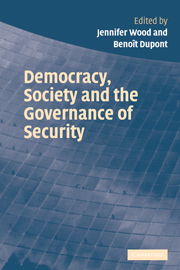Book contents
- Frontmatter
- Contents
- List of contributors
- Foreword
- Acknowledgements
- Introduction: Understanding the governance of security
- 1 Reflections on the refusal to acknowledge private governments
- 2 Transnational security governance
- 3 Two case studies of American anti-terrorism
- 4 Power struggles in the field of security: implications for democratic transformation
- 5 Policing and security as ‘club goods’: the new enclosures?
- 6 The state, the people and democratic policing: the case of South Africa
- 7 Necessary virtues: the legitimate place of the state in the production of security
- 8 From security to health
- 9 Research and innovation in the field of security: a nodal governance view
- Conclusion: The future of democracy
- References
- Index
2 - Transnational security governance
Published online by Cambridge University Press: 22 September 2009
- Frontmatter
- Contents
- List of contributors
- Foreword
- Acknowledgements
- Introduction: Understanding the governance of security
- 1 Reflections on the refusal to acknowledge private governments
- 2 Transnational security governance
- 3 Two case studies of American anti-terrorism
- 4 Power struggles in the field of security: implications for democratic transformation
- 5 Policing and security as ‘club goods’: the new enclosures?
- 6 The state, the people and democratic policing: the case of South Africa
- 7 Necessary virtues: the legitimate place of the state in the production of security
- 8 From security to health
- 9 Research and innovation in the field of security: a nodal governance view
- Conclusion: The future of democracy
- References
- Index
Summary
Introduction: The nodal model of governance
Understanding shifts in governance is increasingly difficult. On the one hand, the state continues to play a substantial – some would say an expanding – role in governance. On the other hand, both governance, in general, and security governance, in particular, have experienced significant pluralization. In respect of the latter, available evidence suggests that commercial police outnumber state police by a ratio of almost two to one in Britain (Johnston 2000b), two to one in India (Kempa et al. 1999), between two and three to one in North America (Swol 1998; Rigakos and Greener 2000), five to one in Hong Kong (Johnston 2001b) and between five and seven to one in South Africa (Irish 1999). This pluralization or ‘multilateralization’ (Bayley and Shearing 2001) of security governance has been explained, primarily, in terms of the state's dispersal of functions to the non-state sector under neo-liberal conditions. Yet, that process has been far more complex than existing analogies (‘core’ versus ‘peripheral’ activities, or ‘steering’ versus ‘rowing’ functions) would suggest. For, alongside the devolution of state functions to non-state auspices, there has also been an emergence of new forms of governance outside state parameters (Elkins 1995; Shearing and Wood 2000).
Analogies such as ‘steering’ and ‘rowing’ (Osborne and Gaebler 1993), while providing useful descriptive insights into some governing objectives, remain limited.
- Type
- Chapter
- Information
- Democracy, Society and the Governance of Security , pp. 33 - 51Publisher: Cambridge University PressPrint publication year: 2006
- 29
- Cited by

